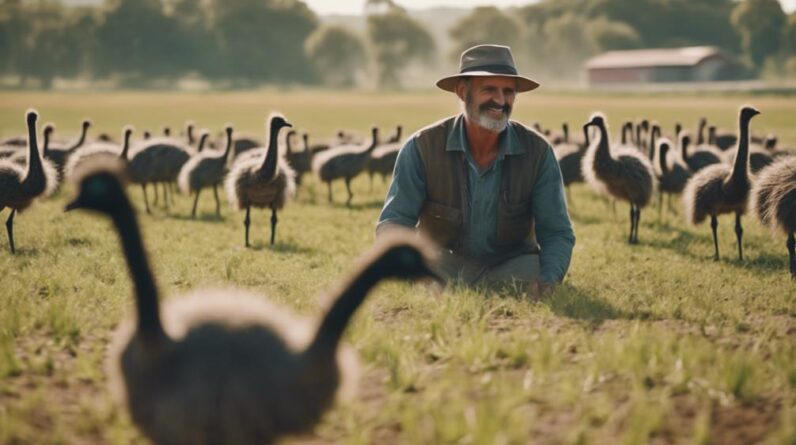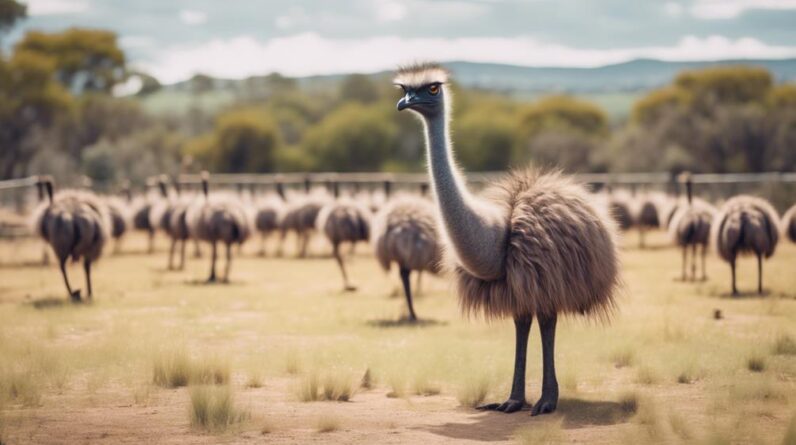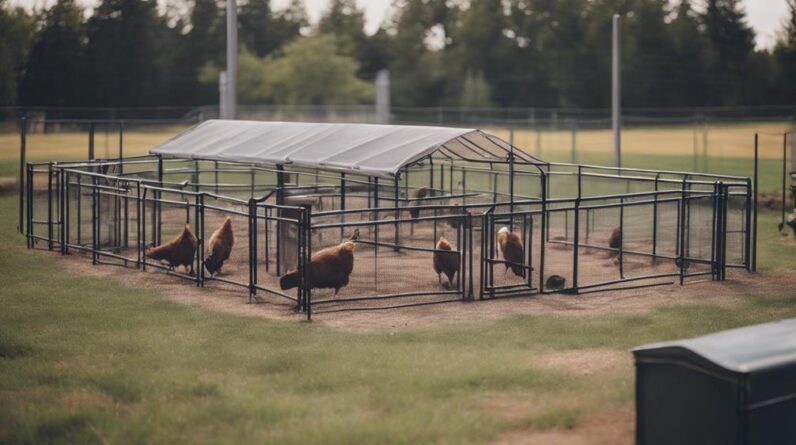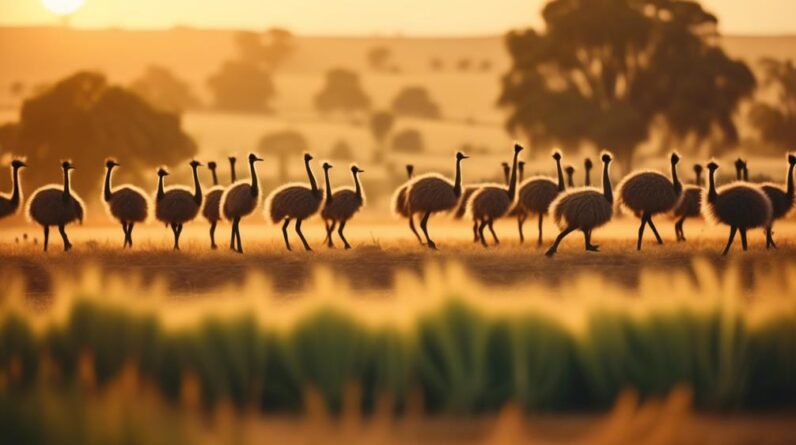
Are you looking for a way to enhance the sustainability of your farm while exploring new opportunities for growth? Consider integrating emus into your farming practices.
Not only do these fascinating birds offer a range of benefits, but they also provide a unique and exciting addition to your agricultural endeavors.
From understanding their habitat requirements to utilizing the whole bird for various products, this discussion will delve into the different aspects of integrating emus into your sustainable farming systems.
So, let's take a closer look at how these magnificent creatures can revolutionize your farm and open doors to a world of possibilities.
The Benefits of Integrating Emus
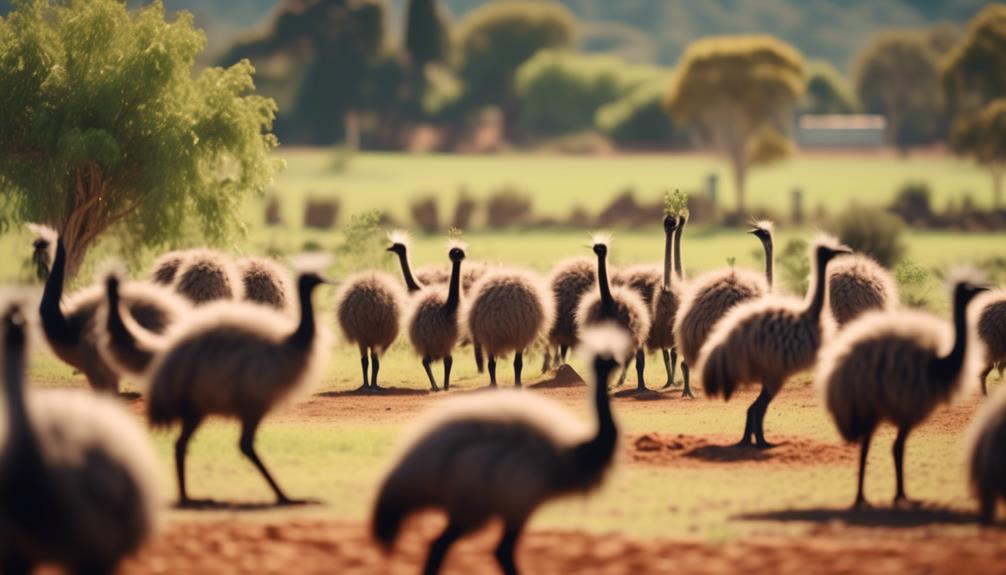
Integrating emus into sustainable farming practices offers numerous benefits, making it a practical and environmentally-friendly choice for farmers.
One of the key advantages of integrating emus is their ability to control weeds on the farm. Emus have a voracious appetite for various types of weeds, including those that are hard to control with traditional methods. By allowing emus to roam freely in designated areas, they can effectively reduce weed growth without the need for harmful herbicides. This not only saves farmers time and money but also minimizes the environmental impact associated with chemical weed control.
Moreover, emus play a vital role in biodiversity conservation. As they forage for food, emus inadvertently disperse seeds throughout the farm, promoting the growth of diverse plant species. This helps to create a more balanced and resilient ecosystem, supporting the presence of beneficial insects, birds, and other wildlife.
Emus also contribute to soil health by their constant movement and scratching, which helps to aerate the soil and improve its fertility. Overall, integrating emus into sustainable farming practices can enhance weed control, promote biodiversity, and improve soil health, making it a win-win situation for farmers and the environment.
Understanding Emus' Habitat Requirements
What are the habitat requirements for emus and how can farmers meet them effectively?
Emus have certain specific needs when it comes to their habitat. To meet their dietary preferences, it's important to provide them with a varied diet consisting of grasses, shrubs, fruits, and seeds. They also need access to fresh water for drinking and bathing.
When it comes to their social behavior, emus are known to be highly social animals. They thrive in groups and require ample space to roam and interact with each other. Farmers can meet this requirement by providing large, open areas for the emus to explore, ensuring that they've enough space to move around freely.
In terms of shelter, emus need adequate protection from extreme weather conditions, such as hot sun or cold wind. Providing them with shelters, such as shade structures or windbreaks, can help in meeting this requirement.
Emus' Nutritional Needs and Feed Management
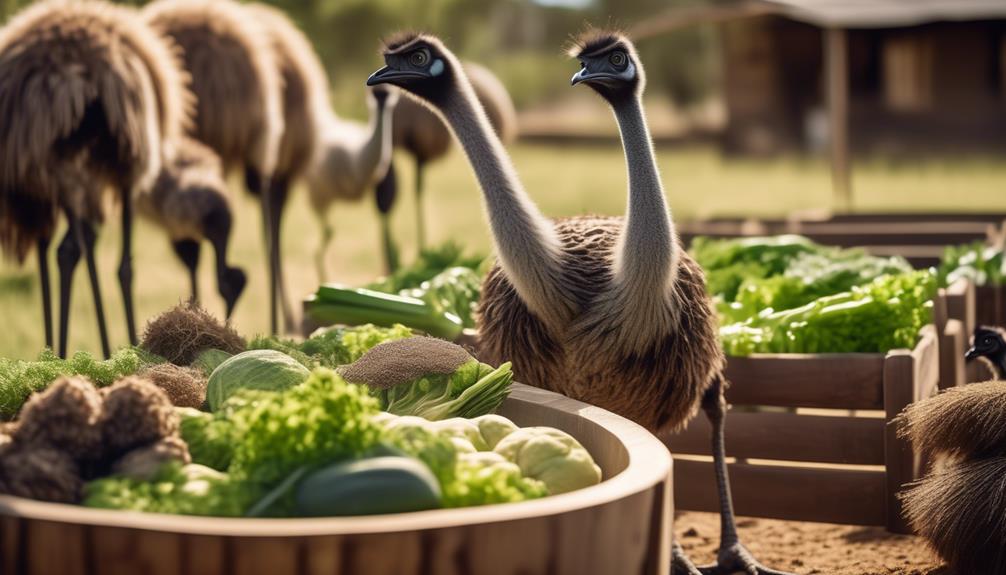
To effectively meet emus' nutritional needs and manage their feed, it's important to understand their dietary requirements and implement appropriate feeding practices. Emus are herbivores and their feeding habits primarily consist of grazing on grasses, leaves, fruits, and seeds.
Here are three key points to consider when it comes to emus' feeding habits and dietary requirements:
- High-fiber diet: Emus require a high-fiber diet to maintain their digestive health. They should have access to fresh, high-quality grasses and forage. Supplementing their diet with hay or pelleted feeds specifically formulated for emus can ensure they receive the necessary fiber.
- Protein requirements: Emus need a balanced amount of protein in their diet for growth and maintenance. Legumes, such as alfalfa and clover, can be included in their feed to provide additional protein. However, it's important to avoid feeding emus excessive amounts of protein, as it can lead to health issues.
- Vitamin and mineral supplementation: Emus require essential vitamins and minerals for optimal health. Providing a commercial emu feed that's fortified with vitamins and minerals can help meet their nutritional needs. Additionally, offering fresh fruits and vegetables as treats can provide additional nutrients.
When managing emus' feed, ensure access to clean water at all times and monitor their body condition to adjust the feed accordingly. By understanding emus' feeding habits and meeting their dietary requirements, you can promote their overall health and well-being on your sustainable farm.
Emu Breeding and Reproduction
Breeding emus requires careful management and understanding of their reproductive behavior. Emus are monogamous birds, meaning they form long-term pair bonds with their mates. During the mating season, which typically occurs between April and June, males will perform a courtship display to attract females. This display includes vibrating their throat pouch, puffing out their feathers, and making low booming sounds.
Once the pair has formed, the female will lay her eggs in a communal nest, which is typically a shallow depression in the ground. The female will then leave the nest and the male will take over the responsibility of incubating the eggs. Emu eggs have a long incubation period of around 50-55 days, during which the male will carefully tend to the eggs, turning them regularly and protecting them from predators.
When the chicks hatch, they're precocial, meaning they're able to walk and feed themselves shortly after hatching. The male will continue to care for the chicks for several months until they become independent. It's important to provide suitable nesting areas and ensure that the male has access to a balanced diet during the incubation period to support successful breeding and healthy chicks.
Implementing Emus for Pest Control
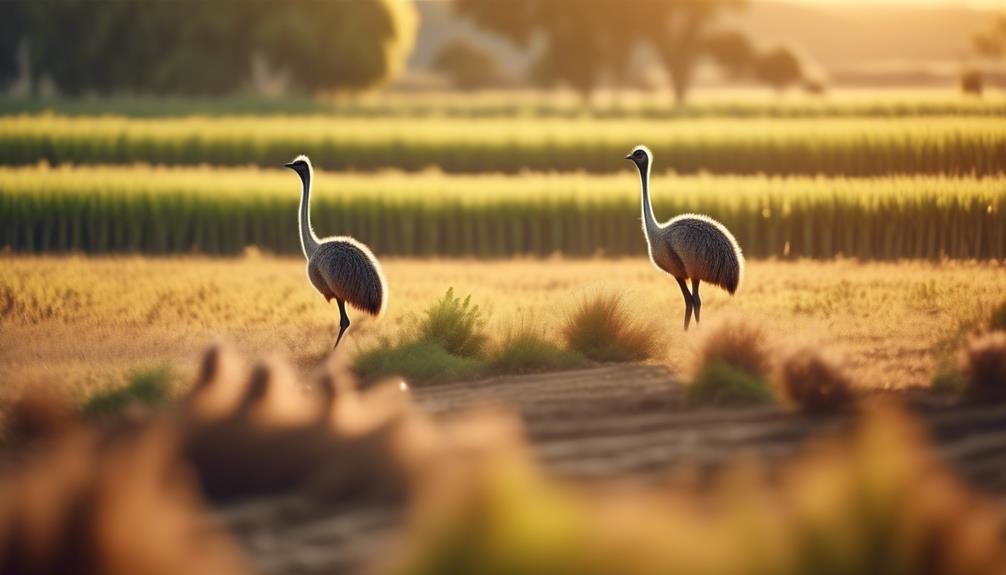
Implementing emus for pest control is a sustainable and effective solution for managing agricultural pests. Emus, known for their large size and inquisitive nature, can play a valuable role in keeping pests at bay on your farm. Here are three ways you can use emus for pest control:
- Natural Predators: Emus have a keen sense of sight and are excellent hunters. They're known to eat a variety of pests, including insects, rodents, and even small snakes. By allowing emus to roam freely in your fields, they can help control pest populations naturally, reducing the need for chemical pesticides.
- Weed Control: Emus are also effective at controlling weeds. They've a voracious appetite and will readily eat various types of plants, including weeds. By grazing on weeds, emus can help prevent them from spreading and competing with your crops.
- Disturbance Factor: Emus' size and movement can create a disturbance factor that deters pests. Many pests, such as rabbits and birds, are cautious creatures and may avoid areas where emus are present. This can help protect your crops from potential damage caused by these pests.
Emus' Role in Soil Fertility and Erosion Control
As you explore the benefits of integrating emus into sustainable farming practices, it's important to understand their valuable role in enhancing soil fertility and controlling erosion.
Emus can contribute significantly to soil fertility improvement, thanks to their efficient digestion and nutrient-rich droppings. When emus consume vegetation, their digestive system breaks down the plant matter, releasing nutrients that are then deposited in their droppings. These droppings, known as 'emusite,' are high in nitrogen, phosphorus, and potassium, essential elements for plant growth. By spreading emusite across your fields, you can replenish the soil with these vital nutrients, increasing its fertility and promoting healthier crop growth.
In addition to soil fertility improvement, emus also play a crucial role in erosion prevention. Their powerful legs and large, sturdy feet help to compact the soil and reduce erosion caused by wind and water. As emus move across the land, their weight and the pressure exerted by their feet compact the soil particles, making it less susceptible to erosion. This compacted soil acts as a protective layer, preventing erosion and retaining moisture. Emus can be particularly beneficial in areas prone to erosion, such as sloping or sandy soils.
Emus as Low-Impact Grazers
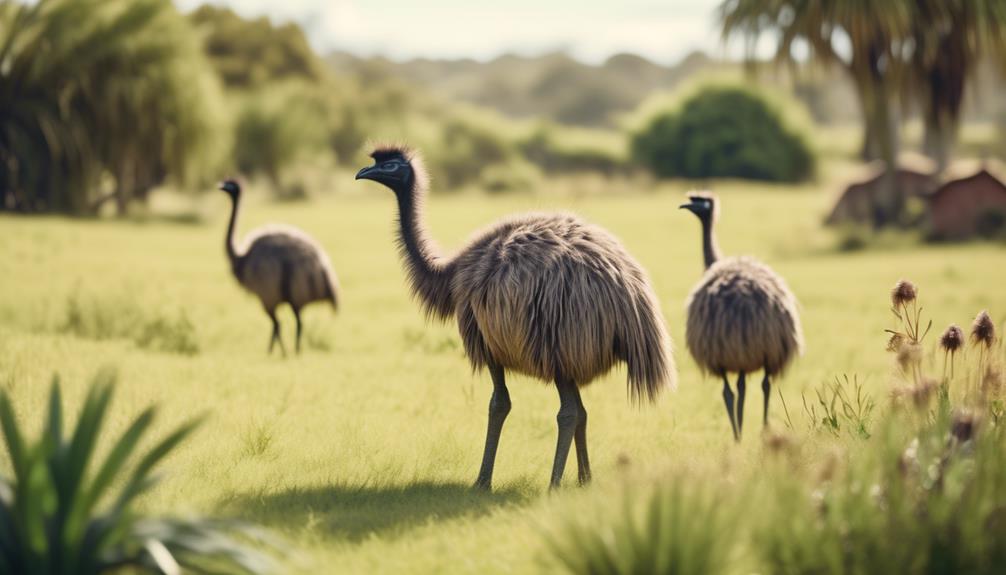
Emus serve as efficient and low-impact grazers, making them an ideal choice for sustainable farming practices. They can help keep invasive plant species in check, reducing the need for chemical herbicides. Emus' impact on pasture regeneration is another significant advantage. Their grazing behavior promotes natural reseeding and allows for the growth of diverse plant species. As they consume plants, they also spread seeds through their droppings, aiding in the reestablishment of a healthy pasture.
Emus and Diversification of Revenue Streams
To diversify your revenue streams, consider incorporating emus into your sustainable farming practices. Emus can provide opportunities for agrotourism, attracting visitors to your farm and generating additional income. People are increasingly interested in experiencing farm life and learning about sustainable practices. By offering tours and experiences centered around emus, such as feeding or observing them, you can tap into this growing market and create a unique and educational experience for your visitors.
Furthermore, raising emus can also help you obtain organic certification for your farm. Emus are naturally low-maintenance and require minimal medication or chemical inputs. Their diet consists mainly of grass and other vegetation, making them well-suited for organic farming practices. By incorporating emus into your farming system, you can demonstrate your commitment to organic and sustainable agriculture, attracting environmentally conscious consumers who are willing to pay a premium for organic products.
Emu Products: Meat and Oil
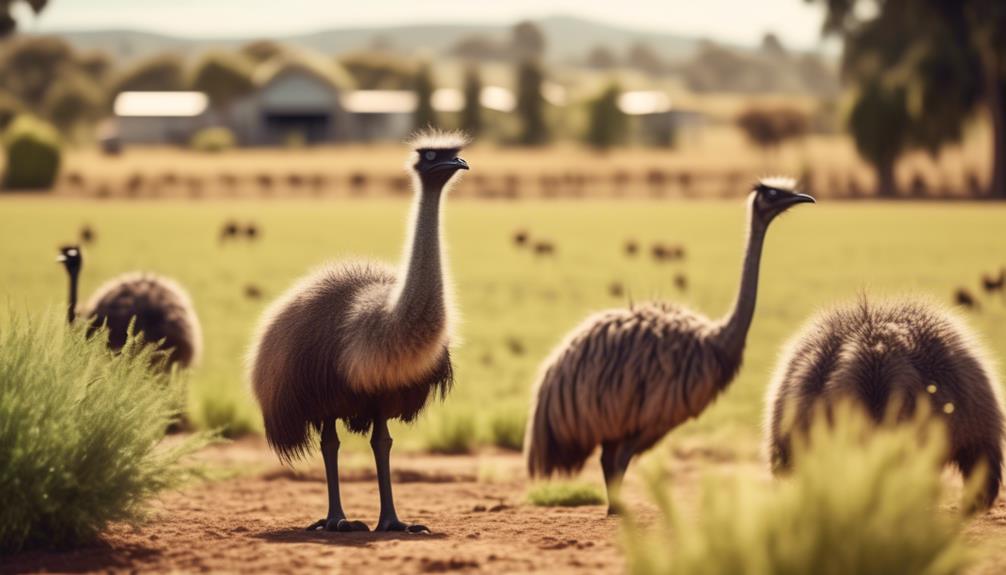
Are you curious about the potential of emu products like meat and oil in sustainable farming practices? Emus can provide not only a diverse revenue stream but also valuable products that can be incorporated into your daily life. Here are three reasons why emu products should be considered:
- Emu meat recipes: Emu meat is lean, flavorful, and a healthier alternative to traditional meats. It's low in fat and cholesterol while being high in protein and iron. You can use emu meat in various dishes, such as stir-fries, burgers, or even emu steaks. The versatility of emu meat allows you to experiment with different flavors and cuisines.
- Emu oil benefits: Emu oil is derived from the fat of emus and has numerous health benefits. It's rich in omega-3, omega-6 fatty acids, and antioxidants. Emu oil can be used topically to moisturize and soothe the skin, reduce inflammation, and promote wound healing. It's also believed to have anti-aging properties and can be used in skincare products like lotions and creams.
- Sustainable farming practices: Emus are environmentally friendly animals that require less land, water, and feed compared to traditional livestock. By incorporating emu products into your sustainable farming practices, you can reduce your carbon footprint and contribute to a more sustainable future.
Emu Feathers and Fiber: Utilizing the Whole Bird
Utilizing the whole bird, emu feathers and fiber offer a range of practical and sustainable applications. Emu feather crafts provide a unique and eco-friendly way to create beautiful and functional items. From feathered jewelry and hair accessories to dreamcatchers and decorative accents, emu feathers add a touch of nature's elegance to your creations. The soft and durable emu feathers can be dyed in various colors, allowing for endless creative possibilities.
In addition to feathers, emu fiber is highly sought after in the textile industry. With its exceptional strength and insulating properties, emu fiber is an ideal material for creating warm and durable garments. Emu fiber is often blended with other natural fibers, such as wool or silk, to enhance its qualities and create luxurious fabrics.
To help you better understand the applications of emu feathers and fiber, here is a table showcasing some examples:
| Emu Feather Crafts | Emu Fiber for Textile Industry |
|---|---|
| Feathered jewelry | Cozy sweaters |
| Hair accessories | Hats and scarves |
| Dreamcatchers | Blankets |
| Decorative accents | Gloves and mittens |
| Feathered home décor | Coats and jackets |
Emu Tourism and Educational Opportunities

Emu farms offer unique opportunities for tourists and learners alike, allowing them to experience firsthand the fascinating world of these majestic birds. Whether you're a nature enthusiast, an aspiring farmer, or simply curious about emus, here are a few ways you can make the most of your visit to an emu farm:
- Emu Conservation Efforts:
Emu farms often play a vital role in conservation efforts, working to protect and preserve these incredible birds. By visiting an emu farm, you not only support their conservation initiatives but also gain insight into the challenges they face and the importance of their conservation.
- Educational Tours:
Many emu farms offer guided tours where you can learn about emu biology, behavior, and sustainable farming practices. You'll have the opportunity to interact with the emus, observe their unique features, and gain a deeper understanding of their role in the ecosystem.
- Emu Feather Art and Crafts:
Emu feathers aren't only beautiful but also versatile. Some emu farms offer workshops where you can learn how to create stunning art and crafts using emu feathers. From jewelry and accessories to home decor and fashion, these workshops allow you to explore your creativity while appreciating the natural beauty of these feathers.
Integrating Emus Into Sustainable Farming Systems
To incorporate emus into sustainable farming systems, farmers can explore various practices that promote environmental stewardship and economic viability. Emus have proven to be beneficial in organic farming, as they provide natural pest control and weed management. Their ability to consume a wide variety of plants and insects makes them an ideal choice for sustainable weed control on farms. By allowing emus to freely roam in designated areas, they can graze on unwanted weeds and reduce the need for chemical herbicides. This not only helps to maintain the integrity of the soil and surrounding ecosystem but also reduces the cost and environmental impact of weed control methods. Emus can also contribute to the production of organic fertilizers through their droppings, which are rich in nitrogen and other essential nutrients. By integrating emus into your sustainable farming practices, you can promote a more environmentally friendly and economically viable approach to weed control and organic farming.
| Benefits of Emus for Organic Farming | Benefits of Emus as Sustainable Weed Control |
|---|---|
| Natural pest control | Grazing on unwanted weeds |
| Reduction in chemical herbicide use | Maintaining soil and ecosystem integrity |
| Production of organic fertilizers | Cost and environmental impact reduction |
Frequently Asked Questions
What Are the Potential Challenges or Drawbacks of Integrating Emus Into Sustainable Farming Practices?
If you're considering integrating emus into your sustainable farming practices, it's important to be aware of potential limitations. One challenge is the economic viability of emu farming, as it requires significant investment and may have limited market demand.
Are There Any Specific Regulations or Permits Required for Keeping Emus on a Farm?
To keep emus on your farm, you'll need to be aware of the permits and regulations in place for emu farming. It's important to research and comply with these requirements to ensure a successful and legal operation.
How Do Emus Interact With Other Livestock or Animals on the Farm?
When it comes to emus and other farm animals, their interactions are like a symphony! Emus can peacefully coexist with livestock, creating a harmonious environment. Just make sure to introduce them slowly and provide enough space for everyone.
Can Emus Be Used for Pest Control in Specific Crop Types?
Emus can serve as an alternative to pesticides in specific crop types, making them a valuable addition to your organic farming practices. They help control pests naturally, reducing the need for harmful chemicals.
Are There Any Potential Health Risks or Diseases Associated With Raising Emus on a Farm?
You might want to know about potential health risks and diseases when raising emus on your farm. It's important to be aware of any issues that could affect the well-being of these animals.
Conclusion
In conclusion, integrating emus into your sustainable farming practices can offer a range of benefits. From pest control to utilizing the whole bird, emus provide a practical and informative solution for farmers.
By adopting emus, you can't only enhance the sustainability of your farm, but also explore new opportunities such as emu tourism and educational experiences.
So why not take a step towards a more sustainable future and join the emu farming community? Embrace the emu revolution and reap the rewards!
